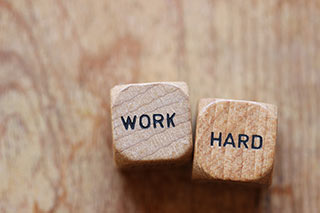 In my last post I identified four specific ways a job at Chick-fil-A builds character and instills positive values in the lives of teenagers and young adults:
In my last post I identified four specific ways a job at Chick-fil-A builds character and instills positive values in the lives of teenagers and young adults:
- It helps them develop a healthy work ethic.
- It teaches them to cultivate resilience; this doesn’t come automatically in today’s culture.
- It shows them the importance of developing a seasonal growth mindset and becoming a life-long learner.
- It requires them to go “the extra mile” and deliver world-class customer service.
In today’s post, we will discuss what it looks like to instill a healthy work ethic in this generation—at work and at home.
It’s no secret that many kids today lack the work ethic of generations past. While this is not a new phenomenon, we have reached the point where we are seeing the fruit of an entire generation raised, for the most part, without a healthy work ethic. Where previous generations were highly productive, our current generations of young people are highly unproductive—or productive at things that don’t matter much at the end of the day.
You may think I’m old-fashioned for saying that, but please hear me out. I’m not one of those “You kids need to get off your phones and get outside!” type of guys, even though statistics show that kids actually do need to get away from their screens and spend time outdoors!
The reason for this is because I have come to realize that I won’t cultivate the things I want to see in my kids’ lives by focusing on the negatives. I won’t develop good things in them by preaching about who I don’t want them to be. Instead, I have to identify the things they need and make a plan to help them cultivate these things in their lives. This must be an intentional process, because things that used to come almost automatically (such as a solid work ethic) aren’t so automatic anymore; in fact, they are downright rare. They don’t learn these things on their own, as a natural part of life anymore—not in a world where there’s an app for everything and they can Google or “ask Siri” anything they need to know. Truth be told, my kids are growing up in a world where they don’t need me for a whole lot. There is nothing I know that they can’t find online. However, one thing I do possess that can’t be “googled” is life experience. They may be able to find the information, but they won’t have a framework to show them what to do with that information. (This is why we see teenagers and young adults talking a big game but failing to back it up!) They may hear that they need to work hard to be successful in life, but that information alone won’t necessarily help them cultivate a healthy work ethic of their own.
A healthy work ethic is more a way of living than just what you do. Most people can work hard—or at least “work”—if they are given a series of tasks, but those with a healthy work ethic know how to proactively look for tasks before they are assigned to them. It’s the difference between a Chick-fil-A team member who waits to be told to restock lids and sauces and a team member who recognizes on their own that they can use moments of downtime to prepare for the next rush by restocking the items at their station.
Unfortunately, you can’t just tell someone, “You need a healthy work ethic!” and expect them to develop one overnight. Sure, you can apply external pressure, such as a threat of demotion or termination, to bring about a temporary behavior modification, but this will not lead to the permanent life transformation of a healthy work ethic.
For team members, we can show them how thinking ahead and being proactive makes the entire shift run smoother; not just for them, but for those around them as well! We can show them how taking steps to be highly productive, rather than waiting to be given a task, can lower their stress levels and make their jobs more enjoyable. However, at the end of the day, some will rise to the occasion and develop a healthy work ethic while others will not. Sadly, some may go their entire lives without doing this, choosing instead to do just the bare minimum—as little as possible to get by.
This is why I believe developing a healthy work ethic doesn’t start on my kids’ first day of work, as though sixteen years of bad habits are going to be magically cured overnight. Rather, it starts from a young age, and it starts at home. My wife and I live on a farm with our seven children, and each of them (with the exception of baby Owen) have chores they are expected to do around the house and farm. These include what I would call “normal” chores—helping with the dishes, cleaning the house, putting away their toys—but you would be amazed at how many parents either start out doing these things for their children or give up fighting to get them to do their chores because it’s easier to just do it for them.
Additionally, many of our kids (when they reach a certain age) are expected to do their own laundry; it is not my wife’s responsibility to be the “laundry guru” for everyone in the house. I have noticed many moms do their kids’ laundry for them up until they leave for college or move out on their own. Imagine eighteen to twenty years—that’s two decades—of having something done for you, then you’re suddenly on your own and expected to do it yourself. They don’t know how to even do laundry, because no one taught them! And even if they “knew” how to do it, there was never an expectation that they would actually have to do it themselves. This is a very rude awakening, and part of the reason why, to borrow Tim Elmore’s terms, “Helicopter parents create boomerang kids” who “boomerang” back home after college to live with Mom and Dad into their late twenties or even their thirties.
Beyond these household chores, we look for ways to intentionally create hardship in the lives of our children. This may seem intense, but hardship is a part of life! Why would we protect them from something for eighteen years—subconsciously teaching them that it doesn’t exist—only to let them loose in the real world where hardship is a part of life and one the primary ways we mature? Yes, we actually grow through hardship! So why not embrace it and help our kids embrace it from a young age?
We have quite a few different types of animals on our farm, and some live up by our house as “pets” for our kids. These animals are one of the ways we create hardship … by creating extra chores! We probably wouldn’t have some of these animals if we didn’t have kids, but by having them it forces them to take responsibility—and they really enjoy having these pets as well! This teaches them that some things in life that bring us enjoyment also require a lot of work.
Finally, some of our kids have started their own businesses. Some of my daughters have a business called Sassy Sisters, where they make jewelry to sell online and at my mom’s antique store in Cedartown. While we are here to guide and coach them, this is their business. It’s not like the cookie stand where Mom is really selling the cookies to help her daughter sell the most so she can win an iPad. They are ultimately responsible. No one is telling them what to do or micro-managing them; they are their own boss and must learn to take initiative. Now, if only we could get them to do this with laundry and the dishes!

Zach Thomas is an entrepreneur, Chick-fil-A franchisee, business/life coach, public speaker, blogger, and author of Leader Farming: Growing Leaders to Grow Your Business. His next book, Pioneer Parenting: A Guide for Raising Kids in Uncharted Territory, is expected to release in 2020. Download a free preview chapter at www.pioneerparenting.org/about.







I truly appreciated this post. The value add of a healthy work ethic framework is one I am constantly thinking about in my work as a recruiter of talent for two CFAs. One of our restaurants is located in an affluent area and most of the kids do not “have” to work so you get that kid looking for a way to fluff his/her high school resume but asks off every 3rd scheduled shift. Or you get the kid at our other restaurant, different socio-economic demographic where their paycheck literally helps with the household bills. Such a wide range. But in both cases I want them to have the foundation or framework for healthy work ethic. Thank you for your thoughtfulness in your writing. I will be eagerly reading the other posts.
Thanks for your your thoughtful comment to my post, I’ve experienced those that don’t “have” to work as well. Unfortunately, their parents are doing their children a disservice allowing them to grow up with this way. I put a lot of thought into trying to figure out ways to prevent this with my kids.